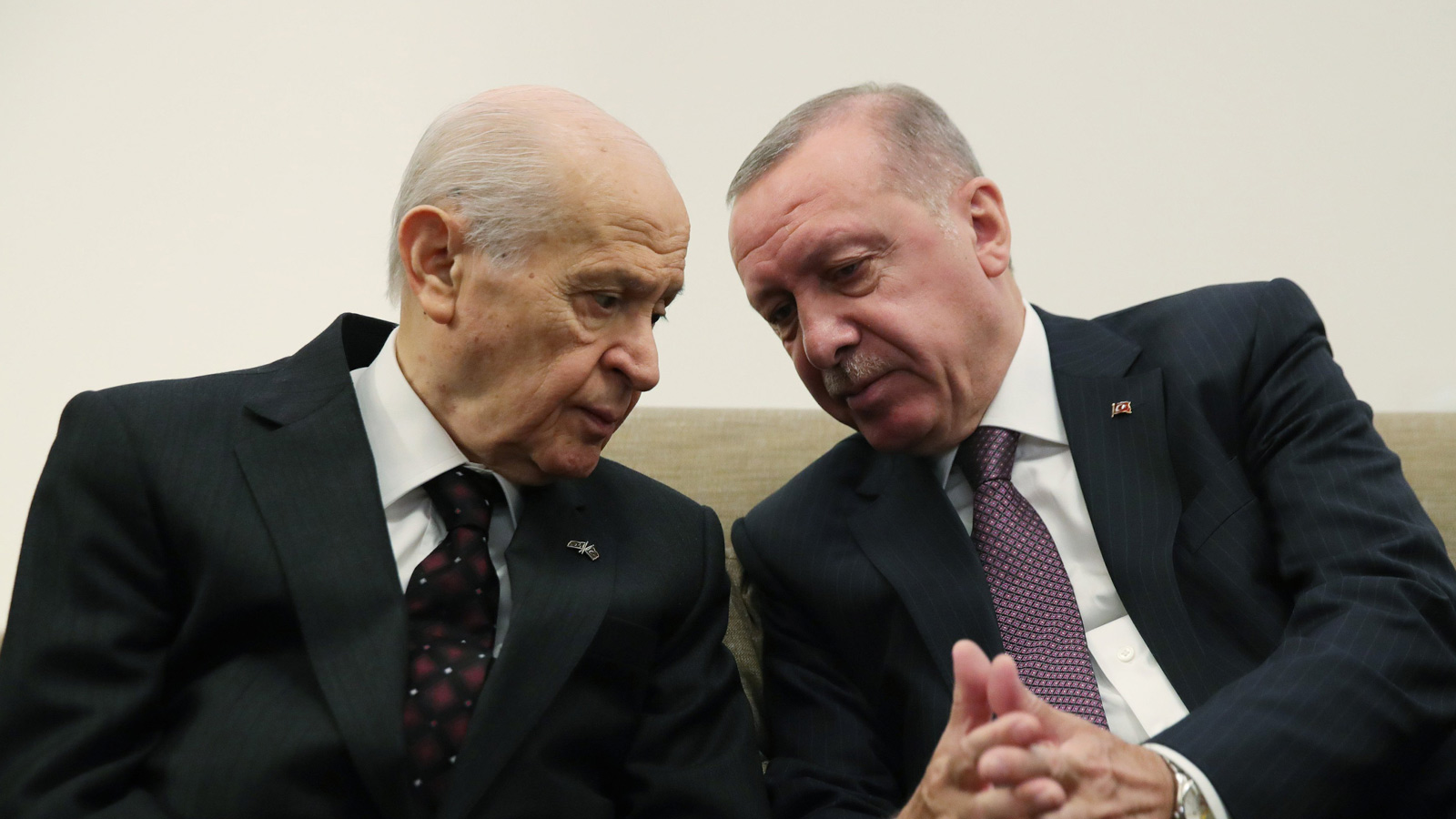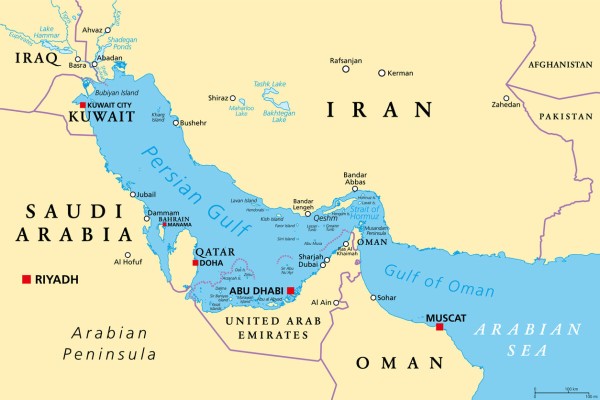Snap elections in Turkey (again)? Unexpected move from the People`s Alliance

Photo: Turkish President Recep Tayyip Erdogan meets Turkey`s National Movement Party`s (MHP) leader Devlet Bahceli at Turkish Grand National Assembly in Ankara, Turkey on November 19, 2019. Murat Kula/Anadolu Agency via Getty Images
As we enter the slowdown phase of the pandemic, political processes in the world begin to revive. A significant activity in Turkey's domestic politics has been observed since the end of April 2020. Election discussions within the ruling circles came as a surprise to many. The recent intensification of proposals for the presidential and parliamentary elections scheduled for 2023 has raised questions about the possibility of holding snap elections in the near future. Let us take a closer look at some of these proposals.
As is known, after the April referendum in 2017, presidential and parliamentary elections in Turkey are held on the same day. According to the new regulations, the "50% + 1" majority principle is used to elect the President. If no candidate obtains a majority of votes, then the top two vote winners go on to compete in a runoff round. This principle has become a central topic of the discussions in recent days. The ruling Justice and Development Party (AKP), led by Turkish President Recep Tayyip Erdoğan, is concerned about the possibility of all opposition parties uniting around a single candidate in the second round. New comments are already being expressed by AKP leadership to change this principle. At the same time, the leadership of the Nationalist Movement Party, an ally of the AKP in the People's Alliance, has voiced conflicting statements about early elections. Especially, MHP leader Devlet Bahçeli`s participation in these discussions, who is known for unexpected election calls in Turkish politics, also shows that early elections are possible.Because of all of this , we will try to look into the reasons that forced the People's Alliance to call for snap elections and the challenges against to this attempt.
The reasons for holding snap elections
The momentum of the pandemic
The Turkish government's crisis management policy during the pandemic is welcomed by the country's society. Compared to developed European countries, the slow spread of the virus and the low death rate in Turkey have formed a positive public opinion about the preventive measures taken by the Erdoğan government. If elections are held in the near future, this positive opinion may turn into voter support. However, the economic crisis in Turkey is expected to worsen after the effects of the pandemic. Especially in the tourism sector, which has a fundamental share in the country's economy, stagnation will be inevitable in the summer of this year. For this reason, it is possible to significantly reduce the severity of dissatisfaction that will arise during the elections by taking the opportunity to link the economic problems with the pandemic.
Political-tactical factors
Various explanations have been mentioned about the secret of Erdoğan's invincibility throughout his political career. Many political analysts attribute this mainly to the lack of alternatives. Indeed, there have been no leaders neither in the ruling bloc nor in the opposition front who can be compared to Erdoğan in the last 17 years. However, the victory of opposition candidates in the last municipal elections in major cities has raised their hopes. Ekrem Imamoğlu, new Mayor of Istanbul, has won the sympathy of Republican People's Party (CHP) supporters, as well as religious-conservative, center-left and Kurdish voters, and is now seen as Erdoğan's biggest political rival. Another likely presidential candidate of CHP, Ankara Mayor Mansur Yavaş, managed to create a successful executive image in a short amount of time and is mainly supported by nationalist voters. Taking into account that both will be mayors for another four years, the ruling bloc is concerned that their popularity may increase over the years. On the other hand, the CHP take-over of big-budget megacities such as Istanbul and Ankara, which had been run by the right-wing fronts (AKP is also attributed to) for more than 25 years, caused a serious blow to the ruling party's propaganda and agitation campaigns in these cities. In particular, the CHP takes the advantage of organizing large political rallies using the vast resources of municipalities. By holding early presidential elections, one of these mayors could be forced to join the race against Erdoğan. This is the main scenario that the ruling front is trying to implement. Due to one of these mayors is going to be the opposition candidate, the relevant vacated municipality will be taken over by the AKP. Because in both cities, the ruling party has a majority in the municipal council, and the new mayor will be elected by this council. Otherwise, if Yavaş or Imamoğlu are not nominated, then both will be neutralized over the next five years.
From the political-tactical point of view, the second case is also very important. The formation of new parties by Ahmet Davutoğlu and Ali Babacan, once key figures of the AKP, threatens the electoral potential of the ruling front. Davutoglu's Future Party (GP) and Babacan's DEVA Party are becoming alternative parties for nationalist and conservative voters who are dissatisfied with the current government but do not want to support the opposition. More precisely, GP and DEVA will cause erosion within the ruling bloc supporters. To prevent this, it is necessary to hold early elections. Because, according to the constitution, a political party that aims to participate in the elections has to form organizations in half of the country's provinces, as well as hold the grand congress six months before the election day. So far, neither the GP nor the DEVA have been fully organised and may not be able to run in the early elections. But some issues complicate this matter. Another article in the constitution gives the right to participate in elections to a party that has a political group (formed by 20 deputies) in parliament. This creates an opportunity for the formation of the political groups of both GP and DEVA in parliament through the temporary transfer of MPs from the opposition parties. “The Transfer of MPs” plan has already been heavily criticized by the ruling bloc. It is even reported that a new bill has been prepared to prevent the transfer of MPs. In fact, this information proves that the People's Alliance is making provision for elections.
The third point is related to the health of MHP leader Devlet Bahçeli. Currently, Erdoğan's main ally, Bahçeli, is the primary reason for the support of religious-nationalist groups to the ruling bloc. This allows the AKP to collect more votes using nationalist rhetoric. On the other hand, the electoral potential of the AKP is only in the 40-45% range, which does not allow it to gain a majority in the parliament alone and elect a president alone. Therefore, the alliance with the MHP, which has a 10% electoral potential, is crucial for the People's Alliance. However, recent health issues of Bahçeli have raised questions about the future of the AKP-MHP alliance. Particularly, the question of whether the post-Bahçeli MHP leader will continue the alliance with the AKP is a matter of concern in the ruling bloc. In order to overcome the threat, it is more suitable to hold elections during Bahçeli`s leadership period.
External factors
As is known, in recent days, groups backed by Turkey in the Libyan conflict have begun to achieve successful results. The performance of the Turkish Army in Libya will significantly increase support for Erdoğan's government in the Turkish community, where militarist sentiments are very high. Therefore, the timely use of the support wave created by successful military operations could create an additional advantage for the AKP.
Another factor is related to the upcoming presidential election in the United States this November. Current U.S. President Donald Trump's attitude towards Erdoğan's government could be considered satisfactory. However, the AKP government is concerned about the prospect of Democrats, who have a tough stance on Erdoğan, to win the U.S. elections. The new White House administration's support for any opposition candidate in Turkey's 2023 elections could significantly reduce the AKP government's chances. Therefore, the Erdoğan government will try to resolve the internal election issue until the new U.S. president is identified.
The challenges for calling early elections
Legal issues
According to the Turkish constitution, snap elections could be called in two ways: request of the President or a 3/5 majority of the Parliament. There are additional matters here. If a snap election is called by the president, the current presidential term is considered finished. This means Erdoğan could not be able to run for president again. Because, the Turkish constitution gives a person the right to be elected president twice, and now Erdoğan is in his second term. It should be also noted that there are disagreements among lawyers about this issue. Some lawyers claim that the governmental system changed in 2017, so Erdoğan's first term should not be taken into account. In any case, this issue will soon provoke heated political debates in Turkish society. To prevent these disputes a snap election has to be requested by the majority of the parliament. Because, according to the constitution, if early elections are called by the parliament, the current term of the president is considered incomplete, and that person has the right to run again. For this, a 3/5 majority of the parliament is needed, which equals 360 votes in the 600-seat Turkish Grand National Assembly. At present, the number of deputies of the People's Alliance is 340. This means that the ruling bloc would need the support of one of the opposition parties to call snap elections. Of course, opposition parties will refuse to support this call until they complete their preparations for the elections. Therefore, the way to call early elections through parliament does not comply with the plans of the ruling bloc, which wants to catch the opposition on the wrong foot. As can be seen, legal obstacles to calling early elections pose significant challenges for the government.
Economic matters
As we know, the election period causes large-scale damages to the economic sectors. It should be borne in mind that when political stability could not be ensured, foreign investors are reluctant to invest or withdraw their investments. Currently, there is a substantial necessity for foreign investment in the Turkish economy, because it is one of the main sources of foreign exchange inflows into the country. In this case, snap elections will lead to a sharp rise in the value of the dollar and the euro, and the rapid depreciation of the Turkish lira. It is reported that Ankara is already negotiating with various countries for borrowing. If the government is able to get enough funds, then it will create a short-term relief in the country's economy, and there will be a “suitable opportunity” to hold early elections.
Propaganda and agitation issues
Consecutive elections in recent years have caused some frustration and anger in Turkey`s public. Also, the ruling party's demand for a second snap election will lead to various interpretations that the AKP has failed to achieve stability in politics and has difficulty in governing. Therefore, there is a need for a convincing explanation in order to call snap elections. In the current situation, there is no reasonable political point for holding early elections, as both the parliamentary majority and the presidency are controlled by the People's Alliance. So, what is the reason for calling a snap election?
Before calling for election, the ruling bloc must find a "satisfying" answer to this question. It should be noted that the AKP also failed to produce rational and coherent political rhetoric in the 2019 municipal elections marathon. That election strategy mainly aimed at deepening ideological polarization in society through antagonistic policies, although it was somewhat effective, did not yield the desired results; mayorships of big cities were left to the opposition. Attempts to re-apply this strategy are unlikely to yield any different results. Admittedly, in recent years, as a political movement, the AKP is experiencing a period of stagnation. The main reason is that the party has been in power for 17 years. In one of his speeches, AKP leader Erdoğan called this stagnation "metal fatigue". This fatigue is evident in the inability of the ruling party to make innovative and progressive political promises on its election platform and to build a distinctive strategy. Of course, economic difficulties should also be emphasized here. The economic contraction hinders the implementation of new infrastructure megaprojects, which have become a kind of tradition during the AKP. Given all this, it would be very risky for the AKP to go to the elections without creating a new wave of enthusiasm among its electorate.
Conclusion
It is really difficult to create a clear outlook of Turkish society, which integrates many different political and ethnic tones. Within such a complex mosaic, it would be very naive to try to make accurate predictions about the political life of Turkey. However, I suppose that the political-tactical factors are the most important among the above. Because in Turkish society the political and ideological orientation is more vital than all other values. It is true that the economic crisis is one of the most universal reasons for the change of government, just as the AKP came to power in 2001 after the severe economic crisis in Turkey. It is crucial to pay attention to how the economic crisis is perceived by society. As a result of the AKP government's counter-propaganda against the economic crisis, the opinion has been formed in public that the crisis was caused not by the wrong economic policy of the government, but by economic attacks on Turkey by foreign forces and "invisible" enemies. This counter-propaganda has even increased support for the government. Nevertheless, as the economic crisis deepens, this "anesthetic" situation in society will begin to lose its impact. As mentioned above, in the current situation, using pandemics as a pretext for economic difficulties, there is a need to hold early elections as soon as possible. It will also minimize the competitive potential of candidates and parties that could be an alternative to the ruling party.
At the same time, the recent wave of protests around the world, especially in the United States, could have a significant impact on whether snap elections will be held.







